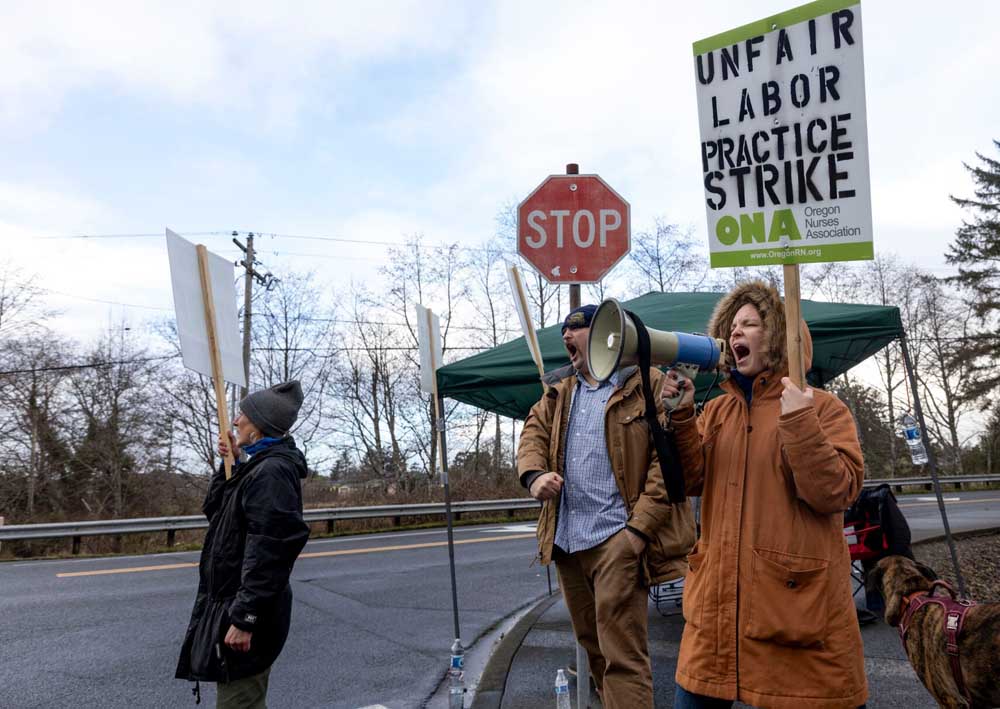Striking nurses make pitch to Seaside council
Published 9:00 pm Wednesday, February 19, 2025

- Katrina Fournier chants into a megaphone during the first day of a nurses’ strike against Providence Seaside Hospital on Jan. 10. Fournier, an emergency room nurse at Providence Seaside, was among the nurses who spoke Feb. 10 to the Seaside City Council.
Providence Seaside nurses gathered at a Seaside City Council meeting Feb. 10 to encourage councilors and the public to support striking health care workers as a statewide strike heads into its seventh week.
Wielding signs that read “Patients Before Profits” and clad in green T-shirts bearing the Oregon Nurses Association logo, two nurses stood before the council to express their concerns with Providence management.
Nearly 5,000 nurses at all eight Providence hospitals in Oregon rejected a tentative agreement between their labor union and Providence management in early February.
The two sides held in-person talks on Feb. 18 and 19 for the first time since Feb. 4. Neither side immediately offered public updates on the progress of those talks, which were held with the assistance of federal mediators.
Peter Starzynski, a spokesperson for the Oregon Nurses Association, said the union sent written proposals to Providence last week.
At the Feb. 10 meeting with the Seaside City Council, two nurses said issues surrounding wages, although important, were not the primary focus of the strikers
“Our focus is on PTO (paid time off) and our health insurance,” said Alex Edwards, a striking medical-surgical nurse at Providence Seaside. “We are nurses, but more than that, we are Seaside nurses. We love our community, and we believe that Providence’s practices and policies are not in the community’s best interest.”
Edwards said that the union also hopes to see staffing levels based on patient acuity — the severity of a patient’s condition and the complexity of their care — instead of based on the quantity of patients being cared for.
A state law passed in 2023 mandating minimum nurse-to-patient ratios has been helpful, but many nurses say it is not enough. Acuity was not addressed in the law, and has become a primary issue in recent negotiations.
“We are happy to provide care for our patients,” Edwards said. “But I ask you this: while we are caring for our patients, while we are caring for our community, who is going to care for the nurses?”
“We urge you, please, convince and ask Providence to come back to bargaining in good faith.”
Katrina Fournier, an emergency department nurse at Providence Seaside, reiterated Edwards’ comments that better wages were just one component in the negotiations. While she said that wages are one component, Fournier echoed Edward’s prioritization of patient acuity, paid time off and adequate health insurance.
“Partners need adequate paid time off to pay our bills when we’re put on call or when we’re sick, because we don’t have sick time, and use our PTO for that,” she said. “Last year, one of our nurses used almost 100 hours of PTO, which was used to pay her bills when she was put on call and when she was sick.
“We also need adequate health care insurance. Many health care workers, including myself, have experienced hardship from the switch to Aetna, in which we didn’t have a choice.”
Fournier said that she was told to use an online pharmacy at no cost, only to receive a text telling her that her medication was not covered by Aetna’s insurance. Using a physical pharmacy to pick up her prescription, she said, would cost $300 out of pocket.
Health insurance company Aetna has cut ties with Providence due to a failure to reach an agreement on a new contract. On Jan. 1, 2025, Providence clinics and hospitals were no longer in-network for those with Aetna insurance.
“If you’re a community member, you can help in the following ways,” Fournier said. “You can contact Providence and ask them to settle our contract and address the crisis of patient care here on the North Coast.
“You can donate to our GoFundMe. This goes to our hardship fund, which helps the striking workers pay their essential expenses while we hold the line and wait for a fair and just contract. And finally, you can come to our picket line and share support and connect.”
The council took no action regarding the strike after the nurses’ comments, and none of the councilors spoke to the issue.
Kristine de Leon of The Oregonian contributed to this article.


